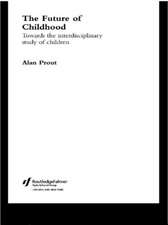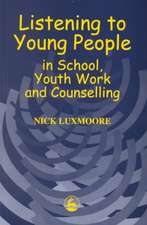Youth, The 'Underclass' and Social Exclusion
Editat de Robert MacDonalden Limba Engleză Hardback – 2 oct 1997
Youth, the 'Underclass' and Social Exclusion constitutes the first concerted attempt to grapple with the underclass idea in relation to contemporary youth. It focuses upon unemployment, training, the labour market, crime, homelessness, and parenting and will be essential reading for students of social policy, sociology and criminology.
Preț: 1380.52 lei
Preț vechi: 1683.56 lei
-18% Nou
Puncte Express: 2071
Preț estimativ în valută:
264.19€ • 286.88$ • 221.92£
264.19€ • 286.88$ • 221.92£
Carte tipărită la comandă
Livrare economică 23 aprilie-07 mai
Preluare comenzi: 021 569.72.76
Specificații
ISBN-13: 9780415158299
ISBN-10: 041515829X
Pagini: 240
Dimensiuni: 138 x 216 x 14 mm
Greutate: 0.43 kg
Ediția:1
Editura: Taylor & Francis
Colecția Routledge
Locul publicării:Oxford, United Kingdom
ISBN-10: 041515829X
Pagini: 240
Dimensiuni: 138 x 216 x 14 mm
Greutate: 0.43 kg
Ediția:1
Editura: Taylor & Francis
Colecția Routledge
Locul publicării:Oxford, United Kingdom
Public țintă
Postgraduate and UndergraduateNotă biografică
Robert MacDonald is Senior Lecturer in Sociology at the University of Teesside
Recenzii
'A useful and stimulating collection of papers which will be of immediate interst to any criminal justice practitioner with young people ... makes vivid and sobering reading and is much to be recommended.' - Labour Campaign for Criminal Justic Newsletter
'A timely addition to the "underclass" debate ... particularly useful for students seeking a general collection addressing issues faced by young people. I found the book successful in challenging my own 'knee-jerk' rejection of the "underclass" concept as politically dangerous.' - Journal of Youth Studies
'Useful for the range of methodologies and evidence it deploys to analyse and debate the appropriateness, or otherwise, of the concept of an underclass in relationship to British youth.' - Journal of Social Policy
'The work presented here serves to establish a framework from which youth researchers can develop both theoretically and empirically; it is a valuable contribution to both the contemporary debate on the underclass and social exclusion, as well as the sociology of youth.' - Sociology Vol 32:2 May 1998
'This volume is highly recommended for all classes of reader: to raise consciousness, among undergraduates and their teachers of the important of conceptual analysis in sociology and of a reasoned use of empirical data that is entirely lacking in the pre-digested pap of mass-marketed undergraduate textbook; as a rich source of new hypotheses for active researchers; as a reminder to policy makers and practitioners of the co-ordinated diversity of interventions needed to combat economic and social marginalisation; and as a reminder to politicians and the press across the political spectrum that it's time to understand a little more and to condemn a little less.' - Policy Studies Vol 19:2 1998
'This is a vital contribution to the debates around youth and social exclusions. It is well written, focused and intensely challenging of mainstream discourses on youth.' - Edge Hill University College, UK
'A timely addition to the "underclass" debate ... particularly useful for students seeking a general collection addressing issues faced by young people. I found the book successful in challenging my own 'knee-jerk' rejection of the "underclass" concept as politically dangerous.' - Journal of Youth Studies
'Useful for the range of methodologies and evidence it deploys to analyse and debate the appropriateness, or otherwise, of the concept of an underclass in relationship to British youth.' - Journal of Social Policy
'The work presented here serves to establish a framework from which youth researchers can develop both theoretically and empirically; it is a valuable contribution to both the contemporary debate on the underclass and social exclusion, as well as the sociology of youth.' - Sociology Vol 32:2 May 1998
'This volume is highly recommended for all classes of reader: to raise consciousness, among undergraduates and their teachers of the important of conceptual analysis in sociology and of a reasoned use of empirical data that is entirely lacking in the pre-digested pap of mass-marketed undergraduate textbook; as a rich source of new hypotheses for active researchers; as a reminder to policy makers and practitioners of the co-ordinated diversity of interventions needed to combat economic and social marginalisation; and as a reminder to politicians and the press across the political spectrum that it's time to understand a little more and to condemn a little less.' - Policy Studies Vol 19:2 1998
'This is a vital contribution to the debates around youth and social exclusions. It is well written, focused and intensely challenging of mainstream discourses on youth.' - Edge Hill University College, UK
Cuprins
1. Dangerous Youth and the Dangerous Class Robert MacDonald, 2. Young People and the Labour Market Malcom Maguire and Susan Maguire, 3. Is There an Emerging British Underclass? The Evidence from Youth Research K. Roberts, 4. Underclassed or Undermined? Young People and Social Citizenship Hartley Dean, 5. Status Zero Youth and the `Underclass': Some Considerations Howard Williamson, 6. The Formation of an Underclass or Disparate Processes of Social Exclusion? Evidence from Two Groupings of `Vulnerable Youth' Debbie Baldwin, Bob Coles and Wendy Mitchell, 7. Youth Homelessness and the `Underclass' Gill Jones, 8. `Destructing a Giro': A Critical and Ethnographic Study of the Youth `Underclass' Shane J. Blackman, 9. The Black Magic Roundabout: Cyclical Transitions, Social Exclusion and Alternative Careers Steve Craine, 10. Changing Their Ways: Youth Work and Underclass Theory Tony Jeffs, 11. Youth, Social Exclusion and the Millenium Robert MacDonald.
Descriere
Is youth crime, unemployment and homelessness evidence of a new and dangerous youth underclass? Contributors focus on unemployment, training and the labour market, crime and benefit fraud, homelessness, parenting and shifts in youth policy
















